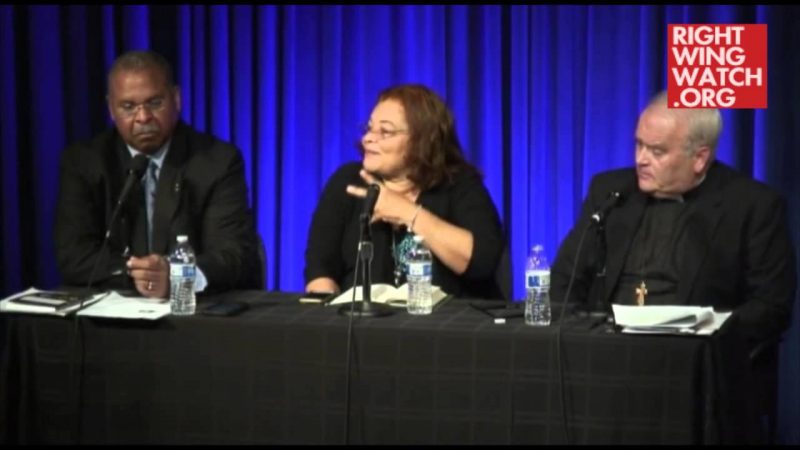Leave it to the folks at the far-right Christian Action League, the American Family Association’s North Carolina affiliate, to come up with an anti-gay twist to the story of Little Red Riding Hood.
In a column for BarbWire today, the group’s executive director, Mark Creech, rewrites the childhood fairy tale into a rather confusing attack on gay rights and the Supreme Court.
Once upon a time there was a dear little girl who loved her grandmother supremely. The grandmother had given to her a little cap of red velvet, which suited her so well she would never wear anything else. Thus, everyone called her Little Red Riding Hood.
…
For a little while longer the wolf spoke with Little Red Riding Hood, mostly telling her about the way wolves are wrongly perceived by people. “Wolves are nothing to be feared, they just want to be treated like everybody else,” he told her.
While on her way, Little Red Riding Hood pondered, “Yes, I think I can understand how the wolf must feel. Perhaps he is a victim, as he says, and his way is not decadent.”
…
“Oh grandmother,” she said, “What big ears, eyes, hands, and mouth you have.”
“Certainly you can appreciate diversity,” replied the wolf. And just when he thought the time was right, he sprang from the bed to eat Little Red Riding Hood.
A woodcutter nearby heard her screams and rushed to save her.
He overcame the wolf with his trusty axe. The townspeople hurried to the scene, cheered and supported the woodcutter, except for five foolish judges.
The five foolish judges declared the woodcutter prejudiced, bigoted, and intolerant. They said he had no right to defend either the grandmother or Little Red Riding Hood. They said the axe must be cast away.
Standing with the five foolish judges were also some clever foxes, relatives of the wolf, who argued the wolf’s proclivity for carnage was completely normal. In fact, to suppress the wolf’s appetites, something which was inherent to his nature, would be wrong, they said. Besides, it was claimed that grandmothers are like old traditions that need to give way to the new anyhow.
And so, on the basis of these considerations, not only did the mindset of many of the townspeople start to change, but the wolf was lauded and praised. Many townspeople would fly the wolf flag from atop their village cottages and buildings. An advocacy group called WUVS, standing for “Wolves, Underfed, Voracious, and Famished,” fought to give wolves special protections in law. And no one dared challenge the true nature of the wolf for fear his house, his livelihood, and even his freedom might be taken away.
So the years passed, grandmother was dead and Little Red Riding Hood would live her life in confusion, always in danger of many wolves and never to enjoy the basket of goodies with her grandmother, whom she had known and loved for so long.
I would not do all the work for the reader here, but if it helps, in this fable of Little Red Riding Hood, the Grandmother is traditional marriage. The wolf is homosexual activism. Little Red Riding Hood is an unsuspecting public, and, in another way, children and their future. The basket of assorted goodies signifies the many blessings and joys of real marriage. The woodcutter is true religion’s opposition to so-called gay rights. His axe is state constitutional amendments to define marriage as one man and one woman. The five foolish judges are the U.S. Supreme Court justices who ruled to redefine marriage for the nation. The clever foxes are professionals who argue homosexuality is inherent, fixed, unalterable, and normal. The townspeople represent ever-changing public opinion.








